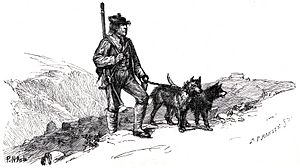Per Gynt facts for kids
Per Gynt is a famous fairy tale from Norway. It comes from the Gudbrandsdal region, which is a beautiful valley in Norway. This story is a part of Scandinavian folklore, which means it's a traditional tale passed down through generations.
The adventures of Per Gynt are set in the historic area of Gudbrandsdal. People traditionally believe that Per Gynt lived on a farm called Nordre Hågå in a place called Sødorp parish, near Nord-Fron in Oppland county.
Contents
What is Per Gynt About?
The tales of Per Gynt explore ideas about who we are, how we connect with others, and the personal journeys of a hunter who is often alone. The story follows Per Gynt and his many exciting adventures.
Per Gynt's Adventures
Per Gynt is known for his brave deeds. He once saved three dairy-maids from scary trolls. He also shot a huge troll called the Bøyg. This troll looked like a giant snake and often blocked the path for travelers.
How the Story Was Written Down
The fairy tale of Per Gynt was first written down by a collector of folk stories named Peter Christen Asbjørnsen. He included the stories in his book Norwegian Folktales (which in Norwegian is Norske Huldre-Eventyr og Folkesagn). This book was first published in 1845.
Where to Find the Story
Asbjørnsen placed the tales about Per Gynt in a section of his book called "Reindeer Hunting at Rondane" (Rensdyrjakt ved Rondane). This shows that the story is connected to the wild, natural areas of Norway.
Per Gynt's Influence on Other Works
The original folk tale of Per Gynt later inspired a very famous play.
The Play by Henrik Ibsen
The Norwegian writer Henrik Ibsen used the folk tale as inspiration for his play, also called Peer Gynt. This play was published in 1867. Ibsen added many new parts to the story. For example, in his play, Per Gynt travels to Africa, crosses the Sahara Desert, and even meets a Bedouin princess. These parts were much grander and more modern than the original fairy tale.
Music for the Play
The play Peer Gynt first appeared on stage in 1876. It had special music written for it by the famous composer Edvard Grieg. Grieg composed the well-known Peer Gynt Suite, which includes popular pieces like "Morning Mood" and "In the Hall of the Mountain King."
Images for kids
 | William Lucy |
 | Charles Hayes |
 | Cleveland Robinson |



